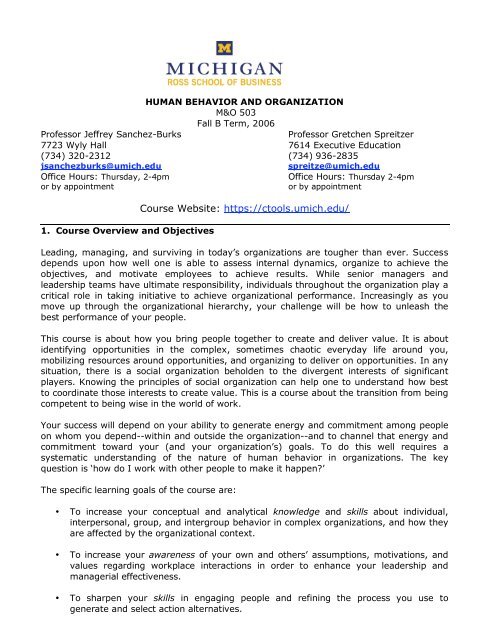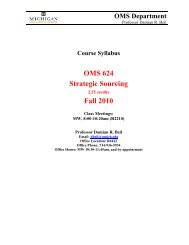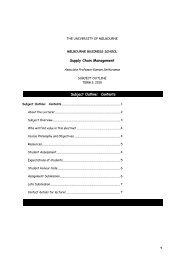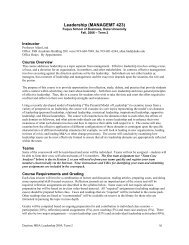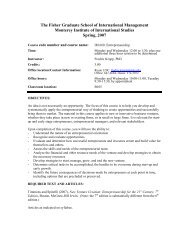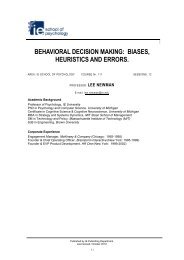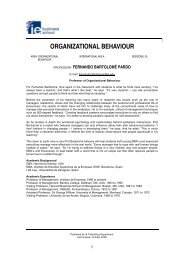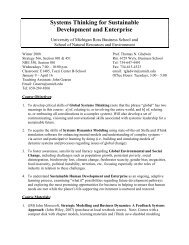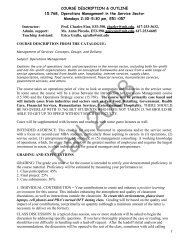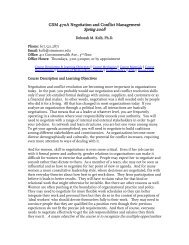Course Website: https://ctools.umich.edu/
Course Website: https://ctools.umich.edu/
Course Website: https://ctools.umich.edu/
You also want an ePaper? Increase the reach of your titles
YUMPU automatically turns print PDFs into web optimized ePapers that Google loves.
HUMAN BEHAVIOR AND ORGANIZATIONM&O 503Fall B Term, 2006Professor Jeffrey Sanchez-BurksProfessor Gretchen Spreitzer7723 Wyly Hall 7614 Executive Education(734) 320-2312 (734) 936-2835jsanchezburks@<strong>umich</strong>.<strong>edu</strong>spreitze@<strong>umich</strong>.<strong>edu</strong>Office Hours: Thursday, 2-4pmOffice Hours: Thursday 2-4pmor by appointmentor by appointment1. <strong>Course</strong> Overview and Objectives<strong>Course</strong> <strong>Website</strong>: <strong>https</strong>://<strong>ctools</strong>.<strong>umich</strong>.<strong>edu</strong>/Leading, managing, and surviving in today’s organizations are tougher than ever. Successdepends upon how well one is able to assess internal dynamics, organize to achieve theobjectives, and motivate employees to achieve results. While senior managers andleadership teams have ultimate responsibility, individuals throughout the organization play acritical role in taking initiative to achieve organizational performance. Increasingly as youmove up through the organizational hierarchy, your challenge will be how to unleash thebest performance of your people.This course is about how you bring people together to create and deliver value. It is aboutidentifying opportunities in the complex, sometimes chaotic everyday life around you,mobilizing resources around opportunities, and organizing to deliver on opportunities. In anysituation, there is a social organization beholden to the divergent interests of significantplayers. Knowing the principles of social organization can help one to understand how bestto coordinate those interests to create value. This is a course about the transition from beingcompetent to being wise in the world of work.Your success will depend on your ability to generate energy and commitment among peopleon whom you depend--within and outside the organization--and to channel that energy andcommitment toward your (and your organization’s) goals. To do this well requires asystematic understanding of the nature of human behavior in organizations. The keyquestion is ‘how do I work with other people to make it happen?’The specific learning goals of the course are:• To increase your conceptual and analytical knowledge and skills about individual,interpersonal, group, and intergroup behavior in complex organizations, and how theyare affected by the organizational context.• To increase your awareness of your own and others’ assumptions, motivations, andvalues regarding workplace interactions in order to enhance your leadership andmanagerial effectiveness.• To sharpen your skills in engaging people and refining the process you use togenerate and select action alternatives.
We achieve our learning goals by introducing you to conceptual models and frameworks,focusing on those that are relevant and useful in today’s business environment. We applythese models and frameworks to cases about real organizational problems and managerialsituations. We have carefully chosen timeless cases that illustrate both importantconceptual models and the common problems managers encounter throughout their careers.The cases provide you with the opportunity to (a) apply conceptual models to makedecisions, (b) develop courses of action, and (c) evaluate their consequences. We will alsohave simulations and exercises to allow you to experience the concepts and dynamicsarticulated in our learning goals.You can put to immediate use the concepts, models, case experiences, and skills you acquirein MO503. You can use the tools from our course to diagnose the organizational issues inthe processes you analyze for MAP, as well as to understand and thrive in the organizationyou work for this summer. You will find that MO503 will be useful throughout your careerbecause the problems we study are the enduring issues every manager must address.2. Daily Class AssignmentsThe specific assignments for the course sessions are described on the following pages. Toensure a high quality learning experience, it is critical that you prepare thoroughly beforeeach class meeting. Read the assigned materials, draw from your organizational and lifeexperiences, and address the specific questions listed on the assignment sheet. Classroomtime will be devoted to extensions, connections, and discussions of prepared materials, andto problem diagnosis and action planning for the assigned case/exercise. You will get themost from each class by participating actively in class discussions each day. Contributionsfrom everyone are critical to the success of the course and to the shared learningexperience.3. Reading MaterialsThere is no textbook for this course. All assigned materials are included in the course packetand on the Ctools site. During the course, we provide additional materials online in additionto links to web sites, to enrich our in-class discussion and your learning experience.4. EvaluationYour course grade is based on four components:1. Midterm caseanalysis2. LEA- LearningExtension & ApplicationIndividualassignmentDue 4pm, Wednesday November 15 th 35%Team assignment Due in class (date to be assigned) 10%3. Final case analysis IndividualassignmentDue 4pm, Thursday December 14th 35%4. Class participation IndividualcontributionSee the Section below on ‘Criteria forEvaluation of Class Participation’20%
Criteria for Evaluation of Case Analyses• Theory: How well do you apply appropriate conceptual materials from the readingsand lectures?• Data: How well do you utilize evidence (e.g., from research, course readings, casematerials) to develop your analysis, to make appropriate inferences, and to supportyour arguments?• Analysis: How well do you integrate theory and data to forge a coherent/integratedanalysis and assessment of the key managerial and organizational issues?• Recommendations: How well do you translate your analysis into a specific action planthat goes beyond general recommendations? How well do you addressimplementation issues?• Organization and Writing: How clear and well organized is your written and in-classpresentation of material? What is the professional quality of your write-up?Note: All written work should be typed using 12-point Times New Romanand 1” margins.Criteria for Evaluation of Class ParticipationYour class participation is evaluated in two ways: (1) Engagement in ExperientialLearning Activities (e.g., Reflected Best Self) and (2) Quality of Contribution to ClassDiscussion. Specifically, we will consider the extent to which your comments: reflect an accurate and thoughtful understanding of the case or readings, do not just repeat what others have said (a sign you haven’t listened), provide new insights and draw on relevant personal experiences, move the discussion in productive directions (e.g., do not monopolize classtime, side-track issues under consideration, ask questions more appropriatelyaddressed outside of class, or otherwise distract the class), rely on facts, evidence, and logic (not just opinion), contribute to an environment of open dialogue, informed debate and learning.In other words, we are interested in the quality of your comments. You may askfor feedback on your class participation at any time.Our discussions will be energetic, with individuals advancing and holding strong views.Developing a professional style of giving and receiving criticism will contribute to yoursuccess as a leader and in this course. Listen carefully and objectively to yourclassmates; view disagreements as an opportunity for learning. By probing,challenging, and defending points of view, we may find where one individual hasweighed certain factors more heavily, made different assumptions, or interpreted factsfrom a different perspective. Identifying sources of conflict can lead to a clearerunderstanding of the situation and the benefits of alternative courses of action.
Laptop/Instant Messaging/Text Messaging etc. PolicyYour fellow students in prior years have strongly advised a ban the use of laptops forthis particular classroom setting. It is the policy of this class that you do not open alaptop computer in class. The intent is to be fully engaged and therefore any othermode of electronic distraction (e.g., text messaging via cell phones) is not allowed.GradingFinal grades will approximate the distribution below in accordance with the School’sestablished grading norms for core classes. This is the maximum allowable for eachcategory.Excellent 25%Good 35%Pass 35%Low Pass 0-5%Fail 0-5%5. Special ConsiderationsIf you think you need an accommodation for a disability, please let me know at your earliestconvenience. Some aspects of the course, the assignments, the in-class activities, and theway I teach may be modified to facilitate your participation and progress. As soon as youmake me aware of your needs, we can work with the Office of Services for Students withDisabilities to help us determine appropriate accommodations. I will treat information youprovide as private and confidential.6. Honor CodePersonal integrity and professionalism are fundamental values of the Ross School community. To helpensure that these values are upheld and to maintain equitability in the evaluation of your work, thiscourse will be conducted in strict conformity with the 2006 Academic Honor Code.The code and related proc<strong>edu</strong>res can be found athttp://www.bus.<strong>umich</strong>.<strong>edu</strong>/Academics/Resources/communityvalues.htm.**Claimed ignorance of this information is irrelevant should a violation take place.
Creating High Performing Teams:Every manager must be able to leverage the tremendous benefits that teams can provide. Teamsare used at some level in virtually every organization. Knowing how to foster effective teamdynamics includes understanding how to help teams avoid common pitfalls in areas such asdecision-making, communication, and coordination. We examine these issues and the ways toempower team members in the case of Taran Swan.Motivating Excellence:An essential skill for all managers is the ability to motivate others. Using the case, WolfgangKeller, we examine how the structural, political and cultural context each affects individual andgroup motivation. In this session, we will discuss how to nurture extraordinary levels ofperformance from those around you.Developing Your Leader Within: Leveraging Your Best SelfThe Reflected Best Self Exercise is one of the most potent mechanisms for developing yourleadership potential. Developed here at the Ross School of Business and now used in MBAprograms and with executives around the world, in this exercise, you will learn more about yourcore strengths and how to leverage them to develop your leadership capability.Putting it all into Practice: A MAP SimulationAs we move toward the end of the course, in this interactive simulation, we will ask you to bringtogether the many principles and concepts you have learned in the class and help Dr. V and othersat Aravind solve some pressing problems related to the retention and motivation of highly traineddoctors. This day will give you a snapshot into what you will experience in your MAP teams andhow you can integrate ideas from the course in a practical way in MAP, your internships thissummer, and your first job after graduation.Sending You Off: Generalized Reciprocity and Social CapitalOn our last day together, you will take part in an interactive exercise called the Reciprocity Ring.You will gain first hand experience with the power of generalized reciprocity as a means ofinfluence as well as get help on an issue of importance to you.
Class 1Date: Monday 10/30, Tuesday 10/31Topic:Case:Readings:Complicating Your WorldviewKim Cunningham (in class)Pfeffer, “The Business Case for Managing People Right”Ancona, “Schemas” and “Three Lenses on Organizational Analysis”Questions:1. What does it take to manage people right? Does it pay off? Think ofexamples when you/others weren’t treated right. What were theconsequences?2. In what ways can schemas be beneficial and in what ways can they beharmful and why should we care?3. What is your dominant informal schema for how organizations work and howcan you become more open to alternative approaches to conduct a morecomplete analysis?4. Why have things gotten so bad at Stover?5. What factors are contributing to the problem?6. What should Elizabeth Stover do?
Class 2Date: Wednesday 11/1, Thursday 11/2Topic:Case:Readings:Toward Managing People RightErik Peterson (A)Greiner, “Evolution and Revolution as Organizations Grow”Hill, “Building One on One Relationships”Questions:1. Assess the current situation at Green Mountain Cellular Telephone (GMCT). Whatare the critical business problems facing GMCT? What factors have contributed tothese problems?2. What should Erik Peterson do to prepare for his upcoming meeting with ChipKnight? What additional changes should Erik Peterson implement, and how shouldhe implement them? Overall, what message should Erik Peterson attempt toconvey to Chip Knight?3. If you were in Erik Peterson’s position, what would you do to manage the situationthat has developed at GMCT? How could you restore confidence among GMCTmanagement that you are an effective manager and change agent?4. Evaluate GMCT in terms of their effectiveness in managing people.
Class 4Date: Wednesday 11/8, Thursday, 11/9Topic:Case:Case:Readings:Power and InfluenceIf your last name begins with A thru K read Donna Dubinsky (A)If your last name begins with L thru Z read Debi ColemanCialdini, “Harnessing the Science of Persuasion”Hill, “What it Really Means to Manage: Exercising Power and Influence”Questions:From the perspective of the case you read:1. What are the influence strategies used by Dubinsky? Coleman? Jobs?2. Why was Dubinsky/Coleman successful initially?3. Put yourself in Dubinsky's/Coleman’s position and consider why sheresponded the way she did to did to the JIT proposal?4. What do you think Dubinsky/Coleman might have done differently?2. Why ?3. Put yourself in Dubinsky's/Coleman’s position and consider why sheresponded the way she did to did to the JIT proposal?4. What do you think Dubinsky/Coleman might have done differently?Special Note#1 : Two online assessments are due for next class. Go to the Ctoolswebsite for the links to them.Special Note #2: The Midterm case will be available for pickup outside your professor’sdoor Thursday (11/9/06) 2pm. Exam questions will be posted on Ctools byThursday 2pm. Your analysis is due no later than 4PM, Wednesday,November 15 th . Please bring your completed analysis to the drop boxesoutside the 7 th floor secretary office in Wyly.
Class 5Date: Monday 11/13, Tuesday 11/14Topic:Case:Readings:Cultural Diversity in a Global ContextKaren Leary (A)Sanchez-Burks & Mor Barak, “Interpersonal Relationships in A Global WorkContext”Due: Complete online-assessments and bring scores to classQuestions:1. How has Leary taken charge of the Elmville branch office?2. What is your evaluation of Chung’s performance?3. If you were Leary, how would you respond to Chung’s request for a privateoffice? What factors would you consider? What specific actions would you taketo improve Chung’s performance, as well as your working relationship withhim?4. What are the particular communication and conflict challenges and dilemmas inmanaging subordinates who have different cultural backgrounds and workingstyles from yours?Special Note: In-class assignment due next class: Bring to class an “artifact” that you thinkreveals something about Ross Business School culture.
Class 6Date: Wednesday 11/15, Thursday 11/16Topic:Case:Reading:Due:Leveraging Organizational CulturesIn class experiential simulationO’Reilly, “Corporations, Culture, & Commitment: Motivation & Social Control inOrganization”Bring to class an “artifact” that you think reveals something about the cultureat Ross School of Business or subculture (e.g., section).Questions:1. How does culture influence organizational behavior?2. What are the key components of culture?3. If you wanted to change the organizational culture, how would you go aboutdoing it?
Class 8Date: Monday 11/27, Tuesday 11/28Topic:Case:Reading:Creating High Performing TeamsTaran SwanHill, “Managing Your Team”Questions:1. Evaluate Swan as a team leader. What are her strengths and weaknesses?2. How effective is the team? Justify your assessment.3. Should she appoint an interim director?
Class 9Date: Wednesday 11/29, Thursday 11/30Topic:Case:Motivating ExcellenceWolfgang KellerReadings: Kerr, “On The Folly of Rewarding A While Hoping for B”Goleman, “Leadership That Gets Results”Questions:1. What is your assessment of Petrou’s performance? Be specific.2. How effective has Keller been as a coach to Petrou? Why? What are theunderlying causes of his performance problems?3. What actions should Keller take upon returning to Athens? Be specific.4. What are the implications for Keller’s development as a leader?5. What can leaders do to build a workforce that will thrive over the long term?
Class 10Date: Monday 12/4, Tuesday 12/5Topic:Exercise:Reading:Developing Your Leader Within: Leveraging Your Best SelfReflected Best SelfDirections on the Reflected Best Self will be posted to Ctools in the firstweeks of class. It will involve you collecting feedback from ten people(family, friends, colleagues) who know you well.Questions:1. Why does knowledge of your core strengths matter?2. What are you now able to see that you hadn’t been able to see before?3. How can you organize your life and career so you can build on the things you loveto do and are masterful at?
Class 11Date: Wednesday 12/6, Thursday 12/7Topic:Case:Reading:Putting it all into practice: A MAP SimulationAravind: Before class view background video available on CtoolsFast Company, “The Perfect Vision of Dr. V.”Coutu, “How Resilience Works”Questions:1. Aravind is concerned with the retention of its highly-trained doctors. Draw onthe principles and concepts discussed in class to evaluate the key issues.Special Note:The final case will be available for pickup outside your professor’s doorThursday (12/7/06) 2pm. The final exam is due no later than 4PM,Thursday 12/14. Please bring your completed analysis to the drop boxesoutside the 7 th floor secretary office in Wyly.
Class 12Date: Monday 12/11, Tuesday 12/12Topic:Sending You Off: Generalized Reciprocity and Social CapitalQuestions:1. From your own experience, what sources of influence and power do you thinkare most persuasive/effective? Least persuasive/effective?2. Who are the energizers in your life? What do they do to create positive energy?3. Why is it often hard to ask for help?


